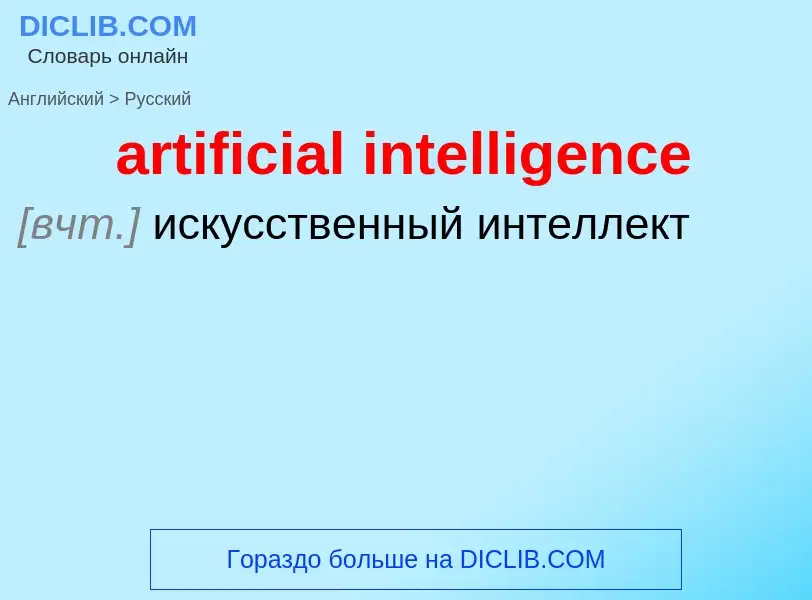Traducción y análisis de palabras por inteligencia artificial ChatGPT
En esta página puede obtener un análisis detallado de una palabra o frase, producido utilizando la mejor tecnología de inteligencia artificial hasta la fecha:
- cómo se usa la palabra
- frecuencia de uso
- se utiliza con más frecuencia en el habla oral o escrita
- opciones de traducción
- ejemplos de uso (varias frases con traducción)
- etimología
artificial intelligence - traducción al ruso
[ɑ:tifiʃ(ə)lin'telidʒ(ə)ns]
общая лексика
искусственный интеллект
AI
искусственный интеллект, ИИ
направление научных исследований и понятие, используемое в связи с разработкой интеллектуальных компьютерных систем, т.е. такими направлениями как экспертные системы, автоматическое доказательство теорем, распознавание образов, машинное зрение, робототехника, понимание естественных языков и др., т.е. систем, обладающих возможностями, которые мы традиционно приписываем человеческому разуму. Термин введён Джоном Маккарти (John McCarthy) летом 1956 г. вместо предложенного в 1950 г. Аланом Тьюрингом термина computer intelligence
«электронный мозг»
Definición
Wikipedia

Artificial intelligence (AI) is intelligence demonstrated by machines, as opposed to intelligence of humans and other animals. Example tasks in which this is done include speech recognition, computer vision, translation between (natural) languages, as well as other mappings of inputs.
AI applications include advanced web search engines (e.g., Google Search), recommendation systems (used by YouTube, Amazon, and Netflix), understanding human speech (such as Siri and Alexa), self-driving cars (e.g., Waymo), generative or creative tools (ChatGPT and AI art), automated decision-making, and competing at the highest level in strategic game systems (such as chess and Go).
As machines become increasingly capable, tasks considered to require "intelligence" are often removed from the definition of AI, a phenomenon known as the AI effect. For instance, optical character recognition is frequently excluded from things considered to be AI, having become a routine technology.
Artificial intelligence was founded as an academic discipline in 1956, and in the years since it has experienced several waves of optimism, followed by disappointment and the loss of funding (known as an "AI winter"), followed by new approaches, success, and renewed funding. AI research has tried and discarded many different approaches, including simulating the brain, modeling human problem solving, formal logic, large databases of knowledge, and imitating animal behavior. In the first decades of the 21st century, highly mathematical and statistical machine learning has dominated the field, and this technique has proved highly successful, helping to solve many challenging problems throughout industry and academia.
The various sub-fields of AI research are centered around particular goals and the use of particular tools. The traditional goals of AI research include reasoning, knowledge representation, planning, learning, natural language processing, perception, and the ability to move and manipulate objects. General intelligence (the ability to solve an arbitrary problem) is among the field's long-term goals. To solve these problems, AI researchers have adapted and integrated a wide range of problem-solving techniques, including search and mathematical optimization, formal logic, artificial neural networks, and methods based on statistics, probability, and economics. AI also draws upon computer science, psychology, linguistics, philosophy, and many other fields.
The field was founded on the assumption that human intelligence "can be so precisely described that a machine can be made to simulate it". This raised philosophical arguments about the mind and the ethical consequences of creating artificial beings endowed with human-like intelligence; these issues have previously been explored by myth, fiction, and philosophy since antiquity. Computer scientists and philosophers have since suggested that AI may become an existential risk to humanity if its rational capacities are not steered towards beneficial goals. The term artificial intelligence has also been criticized for overhyping AI's true technological capabilities.


![AI patent families for functional application categories and sub categories. [[Computer vision]] represents 49 percent of patent families related to a functional application in 2016. AI patent families for functional application categories and sub categories. [[Computer vision]] represents 49 percent of patent families related to a functional application in 2016.](https://commons.wikimedia.org/wiki/Special:FilePath/AI Patent families for functional application categories and sub categories.png?width=200)
![The word "robot" itself was coined by [[Karel Čapek]] in his 1921 play ''[[R.U.R.]]'', the title standing for "Rossum's Universal Robots". The word "robot" itself was coined by [[Karel Čapek]] in his 1921 play ''[[R.U.R.]]'', the title standing for "Rossum's Universal Robots".](https://commons.wikimedia.org/wiki/Special:FilePath/Capek play.jpg?width=200)

![Silver [[didrachma]] from [[Crete]] depicting [[Talos]], an ancient mythical [[automaton]] with artificial intelligence Silver [[didrachma]] from [[Crete]] depicting [[Talos]], an ancient mythical [[automaton]] with artificial intelligence](https://commons.wikimedia.org/wiki/Special:FilePath/Didrachm Phaistos obverse CdM.jpg?width=200)

![For this project of the artist Joseph Ayerle the AI had to learn the typical patterns in the colors and brushstrokes of Renaissance painter [[Raphael]]. The portrait shows the face of the actress [[Ornella Muti]], "painted" by AI in the style of Raphael For this project of the artist Joseph Ayerle the AI had to learn the typical patterns in the colors and brushstrokes of Renaissance painter [[Raphael]]. The portrait shows the face of the actress [[Ornella Muti]], "painted" by AI in the style of Raphael](https://commons.wikimedia.org/wiki/Special:FilePath/Joseph Ayerle portrait of Ornella Muti (detail), calculated by Artificial Intelligence (AI) technology.jpg?width=200)

![particle swarm]] seeking the [[global minimum]] particle swarm]] seeking the [[global minimum]]](https://commons.wikimedia.org/wiki/Special:FilePath/ParticleSwarmArrowsAnimation.gif?width=200)
![Feature detection]] (pictured: [[edge detection]]) helps AI compose informative abstract structures out of raw data. Feature detection]] (pictured: [[edge detection]]) helps AI compose informative abstract structures out of raw data.](https://commons.wikimedia.org/wiki/Special:FilePath/Ääretuvastuse näide.png?width=200)
